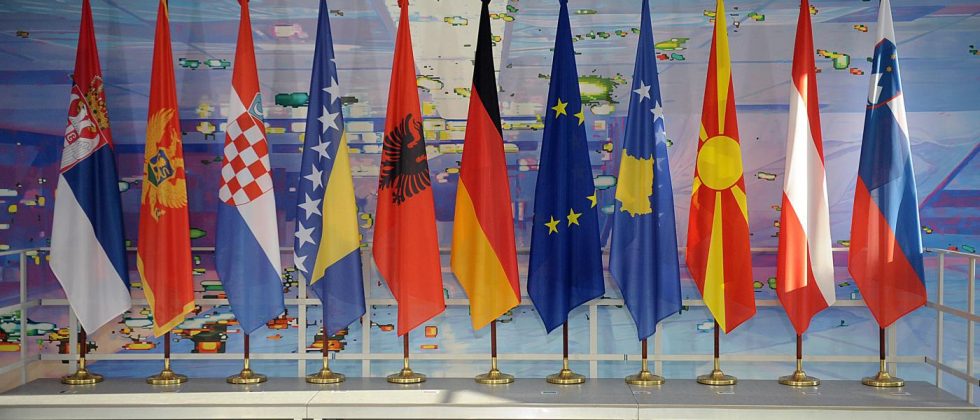

The Berlin Process is the best chance for regional cooperation in the Western Balkans and future EU membership of its countries.
In order to explain why the Berlin Process must continue, one has to understand why it was initiated in the first place.
The Berlin Process was launched in 2014 after EU Commission President Jean Claude Juncker stated that there would be no enlargement under his watch. It was a period when the Western Balkans countries’ EU accession process was at an impasse.
Former German Chancellor Merkel’s political instinct and understanding of the politics accompanying EU enlargement was instrumental for the birth of the Berlin Process. Fully aware of Germany’s responsibility for a peaceful, connected and democratic Balkans, the Berlin Process was initiated to bring back the region on its EU accession track. This meant intensifying regional cooperation, working on sustainable economic growth and resolution of bilateral issues. For the last objective, two have been emphasized: Macedonia (then referred to as FYR of Macedonia) and Greece, and the Belgrade-Pristina dialogue.[1] While one of these bilateral issues has been resolved by lifting the Greek veto and the Council reaching a decision to start accession talks with North Macedonia, the other remains in a stalemate. The main reason to continue the Berlin Process is to finally bring back the Western Balkans on a predictable EU track by having at least four of the six countries start the negotiation process.
Although its bilateral issue with Greece was resolved and North Macedonia came back on track to start the accession negotiation, an EU member state emerged from behind Greece and blocked the country’s accession path which had been already revamped by France with the new Methodology. Bulgaria used its veto power, completely undermining the success of the Prespa Agreement and the international efforts invested in it. By doing so, it prevented North Macedonia from collecting its well-deserved reward. The grounds were purely nationalistic and had nothing to do with the Treaty of Friendship between the two countries which had been previously signed to much praise. To this day, there is no explicit statement by any Bulgarian official on which element of the friendship agreement was not observed. The extremely subjective explanation from Sofia was that the spirit of the agreement was not respected by the Macedonian side.
Now that there is a new political establishment in Sofia as well as in Skopje, regaining trust between the two sides does not seem impossible. However, any solution on the detriment of one side would not lead towards healthy bilateral relations and a truly transformative EU process.
When it comes to bilateral issues, we are back at square one, when the Berlin Process started in 2014. The only difference is that some of the actors have changed. The second important reason to continue the Berlin Process is to overcome the dispute between Bulgaria and North Macedonia, and the need for a breakthrough in the Belgrade-Pristina dialogue.
The Berlin process with Germany in the driving seat created a socialization effect among the Western Balkan political leaders and with the leaders from specific EU member states. Nurturing and building upon this element is very important for regional cooperation in the Balkans and the European future of these countries, thus constituting another very important reason for the Berlin Process to continue. This is especially true considering that the credibility of the EU has all but vanished in this part of Europe after the debacle that was the failure to open accession negotiations with Albania and North Macedonia.
Germany has been perceived as a reliable partner to the Western Balkan countries. The new government in Berlin needs to show that the commitment is still there regardless of the change of leadership. The easiest way to do so is to engage these countries through the Berlin Process.
This process has been labelled as the “highest-ranking political initiative”[2] in the Western Balkans, mostly because of the appeal it has generated among the political leaderships, business community and civil society organisations. Germany was instrumental in building trust between North Macedonia and Greece, which resulted in the signing of the Prespa Agreement. It was the Berlin Process that created an environment which lead to the first visit by an Albanian prime minister to Serbia in 68 years. By now, we have become accustomed to seeing Rama and Vučić discussing regional issues, but this would not have been possible without the Berlin Process.
Furthermore, it contributed immensely to the EU accession process. Out of the six flagship initiatives in the EU’s 2018 credible enlargement perspective, four were promoted directly through the Berlin Process – connectivity, socio-economic development, good neighborly relations, and the digital agenda. Common Regional Market (CRM) promoted by the Regional Cooperation Council, based on the EU’s four freedoms and driving the region towards the EU Single Market, was also pushed through the Berlin Process.
The Western Balkans needs a Berlin Process 2.0, a streamlined intergovernmental process that will focus mainly on the political and economic issues of a strategic importance, further enhance regional cooperation and pave the way for the region’s European future.
[1] https://www.bmeia.gv.at/fileadmin/user_upload/Zentrale/Aussenpolitik/Erklaerung_Englisch.pdf
[2] https://www.oecd.org/south-east-europe/programme/western-balkan-summit-2021-berlin-process.htm